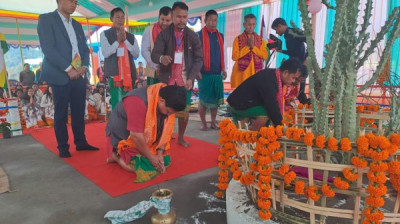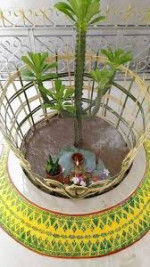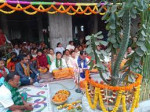History & Traditions
The festival honors the supreme deity Bathou Bwrai, regarded as the creator of the five natural elements—air, fire, earth, water, and sky. Devotees worship by planting the sacred sijou plant (Euphorbia splendens), believed to represent Bathou himself, in a small altar known as Sijousali.
Rituals include traditional prayers, offerings of tamul-paan (betel nut and leaf), and community feasts symbolizing peace, unity, and gratitude to nature. The celebration reflects the deep spiritual connection between the Bodo people and nature, reinforcing harmony among communities.
Today, Gwthar Bathou San is not only a religious event but also a proud expression of Assam’s indigenous identity and cultural revival.
Quick Info Table on Gwthar Bathou San (Holy Bathou Day)
| Particulars | Details |
|---|---|
| Festival Name | Gwthar Bathou San (Holy Bathou Day) |
| Celebrated By | Bodo-Kachari Community |
| Religion | Bathouism |
| Main Deity | Bathou Bwrai (Supreme God) |
| Date of Celebration | Second Tuesday of the Assamese month of Magh (late January) |
| Sacred Symbol | Sijou Plant (Euphorbia splendens) |
| Place of Worship | Sijousali (Courtyard altar) |
| Major Rituals | Sijou planting, offerings, prayers, and community feast |
| Core Beliefs | Peace, unity, nature worship, and harmony |
| Cultural Importance | Symbol of Bodo identity and ancient spiritual heritage |
FAQs with Short Answers on Gwthar Bathou San (Holy Bathou Day)
-
What is Gwthar Bathou San?
Gwthar Bathou San is a religious festival of the Bodo-Kachari people celebrating their traditional faith, Bathouism. -
When is Gwthar Bathou San celebrated?
It is observed annually on the second Tuesday of the Assamese month of Magh, usually in late January. -
What does Gwthar Bathou San mean?
The term translates to “Holy Bathou Day,” dedicated to worshipping the supreme deity Bathou Bwrai. -
Who celebrates Gwthar Bathou San?
It is celebrated by followers of Bathouism, mainly the Bodo-Kachari community in Assam. -
Who is Bathou Bwrai?
Bathou Bwrai is the supreme deity in Bathouism, believed to have created the five natural elements. -
What is the significance of the Sijou plant?
The Sijou plant is considered the living embodiment of Bathou Bwrai and is planted during rituals. -
What are the main rituals of Gwthar Bathou San?
Rituals include offering prayers, planting the Sijou, performing songs, and community feasting. -
Why is Gwthar Bathou San important to the Bodos?
It represents harmony, peace, and a connection between people and nature. -
How old is the religion of Bathouism?
Bathouism is an ancient indigenous faith, predating Hinduism in Assam. -
Is Gwthar Bathou San celebrated outside Assam?
Yes, it’s also observed by Bodo communities in neighboring states like West Bengal and Meghalaya. -
What offerings are made during the festival?
Devotees offer tamul-paan, flowers, and sometimes animal sacrifices as part of tradition. -
What is Sijousali?
Sijousali is the courtyard altar where the Sijou plant is worshipped. -
How do people prepare for Gwthar Bathou San?
Homes are cleaned, altars decorated, and community gatherings are planned before the festival day. -
What values does Gwthar Bathou San promote?
It emphasizes peace, unity, respect for nature, and cultural preservation. -
What is the connection between Bathouism and nature?
Bathouism teaches that all life forms and natural elements are divine creations of Bathou Bwrai.





